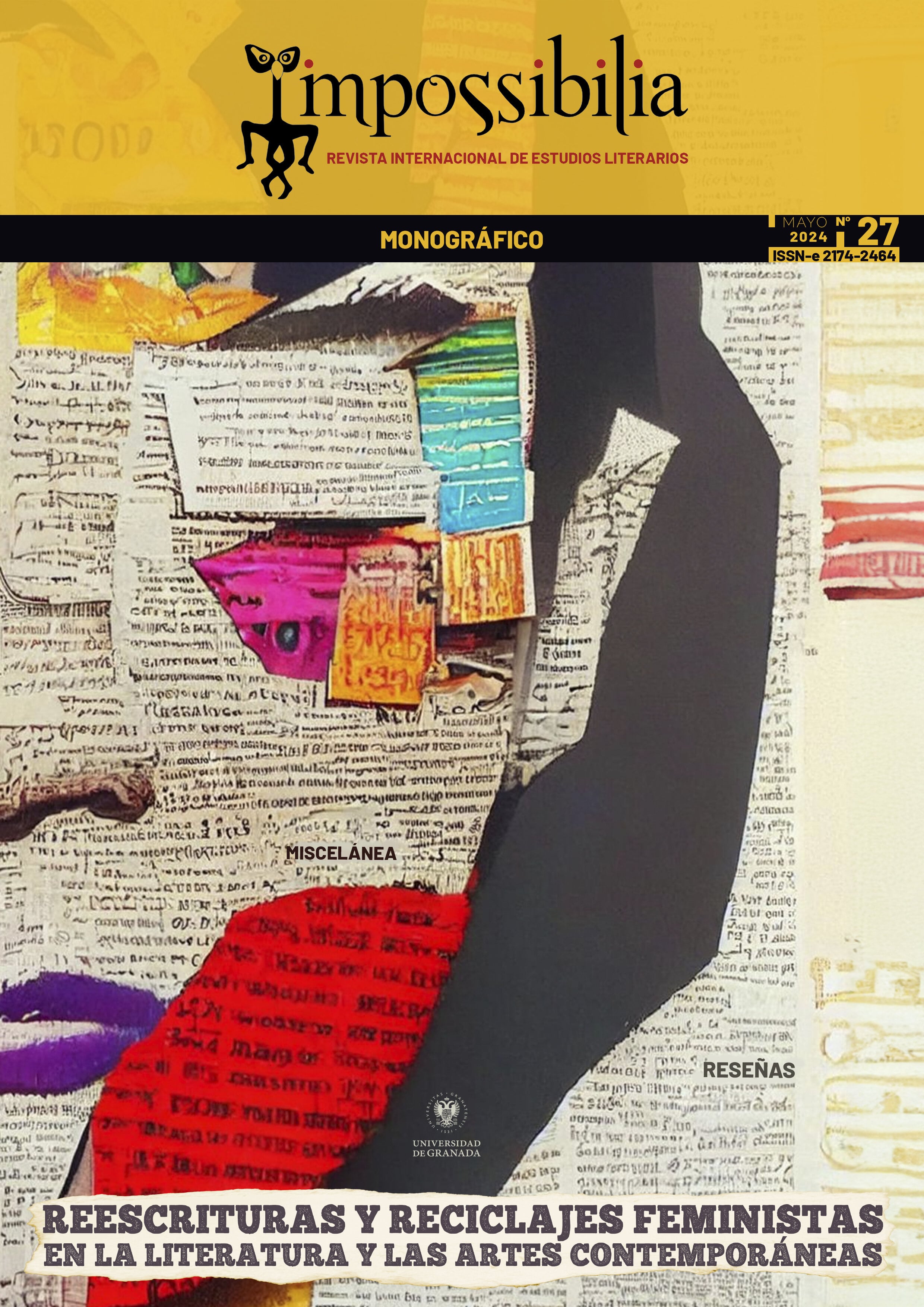African literature in resistance: a feminist and decolonial analysis of Ken Bugul's El Baobab Loco
DOI:
https://doi.org/10.30827/impossibilia.272024.29747Keywords:
African Literature, Colonialism, Cultural Identity, Senegal, Resistance to Oppression, Women’s Liberation MovementAbstract
El baobab loco by Ken Bugul is an autobiographical novel that stands out for its introspective approach and exploration of fundamental themes within African literature. Through her experience, the author highlights the importance of telling her own story by using writing as a means to preserve and transmit narratives that have been excluded from official ones. Hegemonic literature as a colonial device has contributed to the creation of unequal imaginaries by validating certain points of view to the detriment of others. Bugul, then, appropriates writing as a tool to redefine the collective understanding of history through identity, thus challenging the narratives imposed by colonialism. Her first novel invites us to a deep reflection on the importance of writing, literature, orality, and resistance in the construction of a more inclusive and authentic collective memory.
Hegemonic literature as a colonial device has contributed to the creation of unequal imaginaries by validating certain points of view to the detriment of others. Bugul, then, appropriates writing as a tool to redefine the collective understanding of history through identity, thus challenging the narratives imposed by colonialism.
Her first novel invites to a deep reflection on the importance of writing, literature, orality, and resistance in the construction of a more inclusive and authentic collective memory.
Downloads
References
AHIHOU, Christian (2013). Ken Bugul. La langue littéraire. Paris: L’Harmattan.
BALDWIN, James; LORDE, Audre, GOLDSTEIN, Richard; & ABU JAMAL, Mumia (2018). Le diría buenos días! Valencia-Chiapa: Ediciones OnA.
BÁRAKA SAKIN, Abdelaziz (2021). Literatura africana: ¿existe o es una convención sin contenido?. El País, 08/07/2021. Disponible en: https://elpais.com/planeta-futuro/2021-07-07/literatura-africana-existe-o-es-una-convencion-sin-contenido.html
BUGUL, Ken (2018). El baobab loco. Tenerife: Baile del Sol-Casa África.
CÉSAIRE, Aimé (2006). Discurso sobre el colonialismo. España: Akal.
CORTÉS, R., R. (2005). Poesía del caribe francófono. Haití y Antillas francesas. Palimpsestvs, (5), 184-195. Disponible en: https://revistas.unal.edu.co/index.php/palimpsestvs/article/view/8074
DABIRI, Emma (2020). No me toques el pelo. Madrid: Capitán Swing.
DAVIS, Angela (2005). Mujeres, raza y clase. España: Akal.
EMECHETA, Buchi (1983). Second Class Citizen. New York: George Braziller.
DE CALAZANS, Márcia Esteves (2020). Grada Kilomba y la lingüística del racismo. (Recuerdos de la plantación: episodios de racismo cotidiano). (Oliveira, Jess. Trad.). O Público E O Privado, 18(37), 289-301. https://doi.org/10.52521/18.4483
FANON, Frantz (1973). Piel negra, máscaras blancas. Buenos Aires: Abraxas.
FEAL, Laura (2020). Los juglares africanos se llaman ‘griots’ y aún ejercen un oficio milenario. El País, 10/01/2020. Disponible en: https://elpais.com/elpais/2020/01/08/planeta_futuro/1578477784_297707.html
FREIXA, Omer (2014). Museos que eran zoológicos humanos. El País, 16/05/2014. Disponible en: https://elpais.com/elpais/2014/05/16/africa_no_es_un_pais/1400250816_140025.html
hooks, bell (2020). ¿Acaso no soy una mujer? Mujeres negras y feminismo. Bilbao: Consonni.
KAPUŚCIŃSKI, Ryszard (2006). Ébano. Barcelona: Anagrama.
KAKOSI KASHINDI, Jean-Bosco D. (2013). Ubuntu como vivencia del humanismo africano bantú. Devenires, 14(27), 210-225. Disponible en: https://publicaciones.umich.mx/revistas/devenires/ojs/article/view/409
KILOMBA, Grada (2010). Platation Memories. Episodes of Everyday Racism. Münster: Unrast Verlag.
LAHIRI, Jhumpa (2002). Intimate Alienation: Immigrant Fiction and Translation. Translation, Text and Theory. The Paradigm of India, 113-20. Disponible en: https://studylib.net/doc/8998831/intimate-alienation--immigrant-fiction-and-translation
LEWONTIN, Richard C.; ROSE, Steven; & KAMIN, Leon J. (2019). No está en los genes. Racismo, genética e ideología. México: Ediciones Culturales Paidós.
LORDE, Audre (2003). La hermana, la extranjera. Artículos y conferencias. Madrid: Horas y horas.
LAGARRIGA, Dídac P. (Ed.) (2013). Africana. Aportaciones para la descolonización del feminismo. Selección de entrevistas. Barcelona: oozebap.
MARUGÁN RICART, Paola M. (2021). Escrevivência de Conceição Evaristo: el compromiso de la literatura con la vida y viceversa. Argumentos, 37(24), 327-330. Disponible en: https://argumentos.xoc.uam.mx /index.php/argumentos/article/download/1309/1257/
NASCIMENTO DO, Abdias (1980). Quilombismo: An Afro-Brazilian Political Alternative: the Antiquity of Black African Knowledge. Journal of Black Studies, 11(2), 141-178. https://doi.org/10.1177/0021934780011002
NGOZI ADICHIE, Chimamanda (2018). El peligro de la historia única. España: Random House.
OLUO, Ijeoma (2022). Vamos a hablar de racismo. Una guía para entendernos. España: Plankton Press.
SALES SALVADOR, Dora (2003). La ficción transcultural entendida como literatura traducida en el polisistema poscolonial. Linguistica Antverpiensia, New Series - Themes in Translation Studies, 2, 47-60. https://doi.org/10.52034/LANSTTS.V2I.75
SIPI, Remei (2018). Mujeres africanas. Más allá del tópico de la jovialidad. Barcelona: Wanafrica.
SLATER, Jennifer (2019). Sankofa—the Need to Turn Back to Move Forward: Addressing Reconstruction Challenges that Face Africa and South Africa Today. Studia Historiae Eccleasiasticae, 45(1), 1-24. https://doi.org/10.25159/2412-4265/4167
Published
How to Cite
Issue
Section
License
Copyright (c) 2024 Impossibilia. Revista Internacional de Estudios Literarios

This work is licensed under a Creative Commons Attribution-NonCommercial-NoDerivatives 4.0 International License.
















